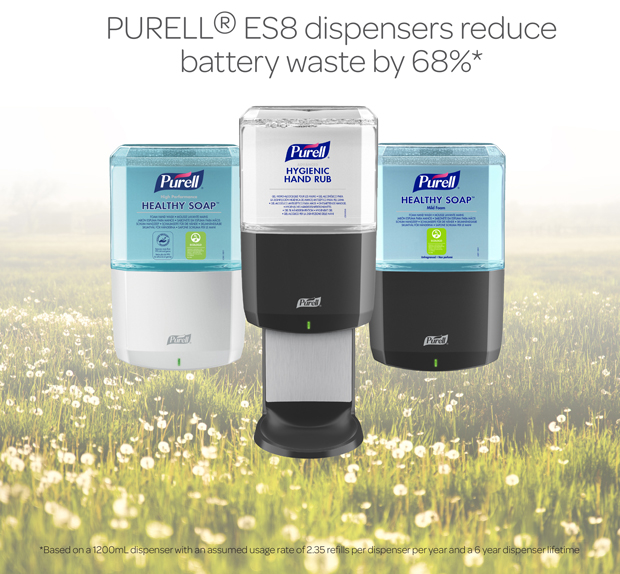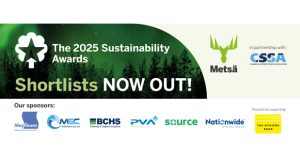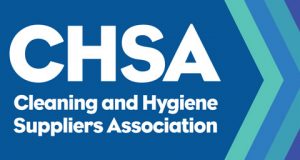Chris Wakefield, Managing Director UK & Ireland, GOJO Industries-Europe Ltd. explains how facilities managers can ensure they are making an environmentally responsible purchases.
As the world unites to tackle climate change, the importance of sustainability has never been greater. This has led to a host of claims from companies about how ‘green’ their products are. But for those who aren’t experts, knowing which assertions to believe can be difficult.
To add to the confusion, it’s not only a product’s sustainable credentials that matter. When it comes to hand (and surface) hygiene solutions, their germ-killing power is also of the utmost importance – especially in today’s world where infection prevention remains high on the agenda.
It’s a fine balance, however, careful selection of the types of hygiene products companies choose to use in working environments can not only improve the wellbeing of a workforce, but also help reach those important sustainability goals.
Third-party verifications
With a myriad of solutions available – and countless more on the market today compared to the beginning of the pandemic – all with differing claims regarding their efficacy and sustainability, looking at third party certifications is a good start to verify any ‘green’ claims.
The right accreditations and labels allow manufacturers to prove that products achieve the highest environmental standards, as well as offering scientific proof that their formulas meet their claims and are effective.
The EU Ecolabel, for example, is the official environmental label in the United Kingdom and the European Union. Established thirty years ago, its flower logo is instantly recognisable – allowing buyers and consumers to make informed choices. All products certified to an Ecolabel standard must meet strict criteria from the extraction of raw material through to production, use and disposal.
The Cradle to Cradle Certified™ Products Program is another certification that buyers can trust. Dubbed the world’s most advanced standard for safe, circular, and responsible materials and products, it looks at more than just a product’s ingredients.
To achieve certification, products are assessed across five sustainability categories: material health, material re-utilisation, renewable energy and carbon management, water stewardship, and social fairness. This comprehensive analysis goes beyond being a recognised mark of product quality – it is a process that leads companies to make better products, better companies, and better communities. Last year, over 350 products connected to the PURELL® range, one of the most trusted brands for skin and surface sanitising, achieved Cradle to Cradle certification.

Once a product’s eco-credentials have been substantiated, FMs need to check its formulation has undergone scientific testing to guarantee its performance. When it comes to hand hygiene products, they need to deliver against a few key standards: EN1500; EN 14476; EN 1276; EN13727; and for wipes, EN16615 – the gold standard for wipes, due to the fact it is evaluated in real world scenarios.
Product design
In addition to third party certifications, look at the design of the products themselves. For example, the best hand hygiene products will be packaged in materials that can easily be recycled.
As well as the product packaging, think about the dispensers that house soaps and sanitisers. Are they built to last? Robust designs, including reliable and efficient mounting accessories, should ensure a trouble-free performance, reducing the maintenance burden of a product and cutting the associated logistics, emissions and inefficiencies of fixing unreliable products.
Modern dispensers are often developed with the environment in mind and many have sustainable features built in to boost efficiency and minimise wastage. For example, touch-free technology enables dispensers to release just the right amount of product for each usage, ensuring that resources are not wasted.
Company credentials
Finally, responsible purchasers should look beyond the products themselves and scrutinise the parent company to see how committed it is to sustainability. Do they have any environmental targets beyond the products they manufacture and market? Have they got any accreditations that validate their efforts to lower their carbon footprint?
One of the world’s largest and most trusted provider of business sustainability ratings, with a global network of more than 85,000 rated companies, is EcoVadis. Built on international sustainability standards, including the Global Reporting Initiative, the United Nations Global Compact, and the ISO 26000, its methodology assesses how well a company has integrated the principles of Sustainability/CSR into their business and management systems. GOJO has recently been recognised as a growing leader in sustainability, with its score placing it in the top 25% of businesses evaluated by EcoVadis worldwide.
Other environmental standards to watch out for include ISO 14001; an internationally recognised standard that helps businesses control the environmental impacts of its activities, products and services.
Buying with confidence
By selecting products that are verified by third-parties, from companies who have also had their commitment to the environment certified by independent organisations, buyers can purchase in confidence, knowing they are making sustainable choices.
Choosing a trusted supplier can make all the difference. They do all the legwork – innovating and developing more sustainable products, having them independently evaluated both in terms of their performance and their sustainability rating – and take their own environmental credentials seriously. They understand that not everyone is an expert in sustainable science, but go the extra mile to help their customers to make better, more responsible choices. In doing so, they help support their customers’ sustainability goals, which can only be a good thing for the health of our planet.





